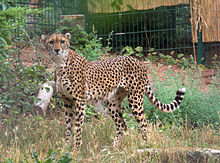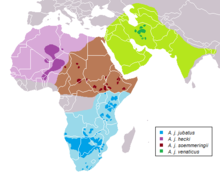Sudan cheetah
| Sudan cheetah | |
|---|---|
 |
|
| A female Sudan cheetah in Zoo Landau, Germany. | |
| Scientific classification | |
| Kingdom: | Animalia |
| Phylum: | Chordata |
| Class: | Mammalia |
| Order: | Carnivora |
| Family: | Felidae |
| Genus: | Acinonyx |
| Species: | A. jubatus |
| Subspecies: | A. j. soemmeringii |
| Trinomial name | |
|
Acinonyx jubatus soemmeringii (Fitzinger, 1855) |
|
 |
|
| A. j. soemmeringii range (brown) | |
| Synonyms | |
|
Acinonyx jubatus megabalica |
|
Acinonyx jubatus megabalica
(Heuglin, 1863)
Acinonyx jubatus wagneri
(Hilzheimer, 1913)
The Sudan cheetah (Acinonyx jubatus soemmeringii) is a cheetah subspecies native to Central and Northeast Africa. It lives grasslands, savannahs, lowlands of the Nile Valley, inland Lake Chad, arid Sahelian and Saharan deserts and steppes. Its population is fragmented in several areas of South Sudan, Ethiopia, Chad, Somalia and the Central African Republic. It is also nearly extinct in Sudan. Other common names are Somali cheetah,Northeast African cheetah or Central African cheetah. The Sudan specimen was first described by the Austrian zoologist Leopold Fitzinger under the scientific name Cynailurus soemmeringii in Bayuda Desert of colonial Sudan in 1855.
Once widespread throughout central to northeast Africa, it was driven to extinction in Cameroon, Nigeria, Egypt and northern Democratic Republic of the Congo. In the 1970s, the Sudan cheetah population of the Northeast region was estimated at 1,150 to 4,500 individuals. Since 2002, it is classified as Vulnerable by IUCN, due to low densities, habitat loss and being smuggled from the Horn of Africa to the Middle East, and the Sudan cheetah population has been estimated at fewer than 2,000 cheetahs in the wild. The population is still increasing slowly due to conservation efforts and breeding programs in Europe and the Middle East.
...
Wikipedia

